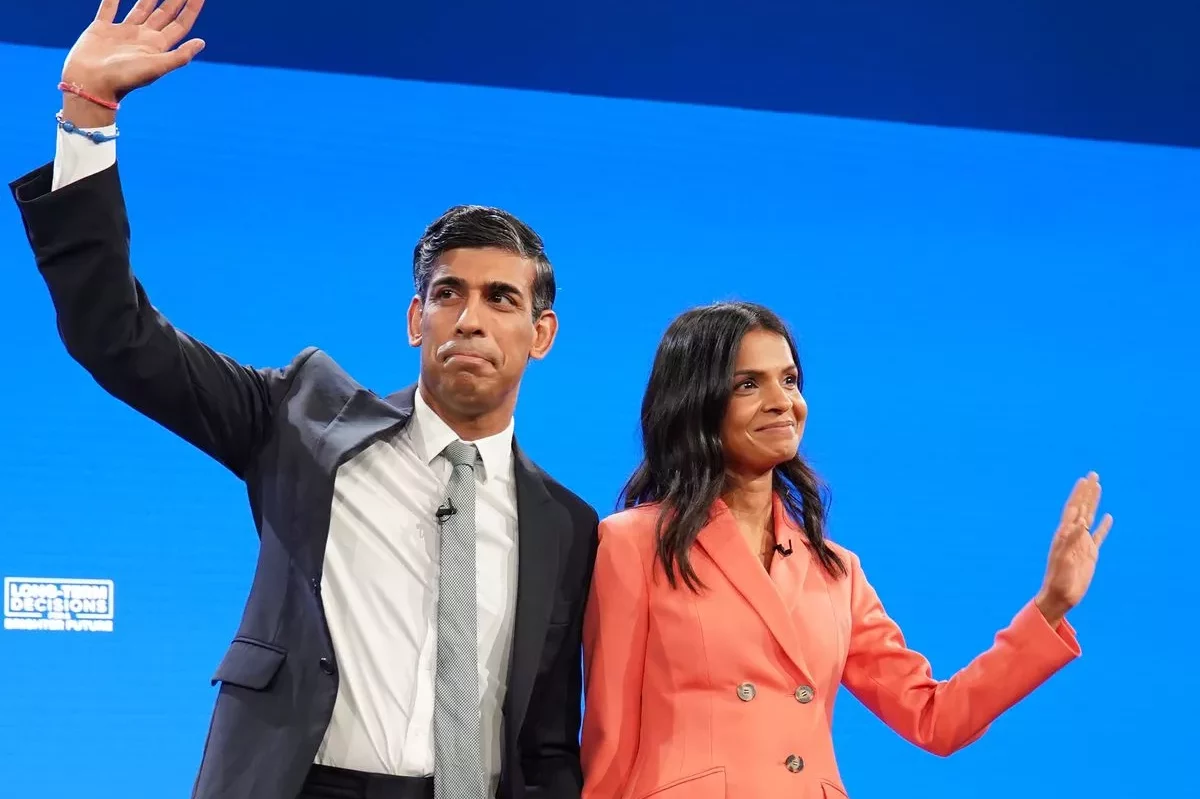Fall in the UK is the season for party conventions. They usually have the attention of journalists, politicians and political analysts. This year, what happened at the Conservative convention was watched with particular interest. In a year’s time, or perhaps sooner, there will be elections to Parliament.
The ruling party’s ratings do not give the Tories much hope of victory. In addition, this convention could prove to be the last for both Rishi Sunak as prime minister and party leader and the Tories as the ruling party. That’s why Sunak and his image-makers decided to breathe “new life” into his image.

From the beginning, Rishi Sunak was seen by many as a dull technocrat, a “good boy, an excellent student” who came to clean up the mess made by his predecessors. But at this convention he appeared as an innovator and almost a revolutionary. He boldly dumped the last 30 years of party life on the scrap heap of history, declaring that all those years (read: everything since Margaret Thatcher) real politics simply didn’t exist.
This unexpected and bold turn was noted by all observers: “Sunak attacks his predecessors,” read a headline in The Times. In her view, Rishi Sunak risks losing his post by promising to break the previous order and the established consensus.
Newspapers traditionally supportive of the Conservative party endorsed his “radical call for unity,” as The Sun wrote.
The liberal The Guardian predicts the beginning of a “civil war within the Tory party” as a result of Sunak’s sensational, albeit expected, decision to abandon the costly construction of the second phase of the high-speed rail link between London and the North of England, the long-suffering HS-2, which would have connected Birmingham and Manchester. War within the party has not yet broken out, and some, on learning of the government’s refusal to spend billions of pounds more, with the total amount would have already reached almost 100 billion, breathed a sigh of relief. Many welcome the Premier’s promise to spend money on building rail service within the region. True, the Daily Mirror, usually supportive of Labor, calls the decision a “railroad disaster” and predicts further economic decline in the north.
Other bold promises by Sunak have also elicited mixed reactions. The idea of a gradual introduction of a complete ban on smoking among young people and the proposal to raise the age of those who are strictly prohibited from selling tobacco products did not appeal to everyone. Opponents of the ban counter that it would only create a black market for the trade (for those not in the know, it already exists in England). For some conservatives, such interference in human rights means a return to nanny government, an anathema to the Conservative Party. This was recalled by Sunak’s predecessor Liz Truss. However, to the Prime Minister’s credit, he promised that the vote in Parliament on the bill would be “free”, meaning that Tory MPs would be able to vote without toeing the party line.
“My values are simple: service, family, work.”
Many observers noticed campaign overtones in the way Sunak presented himself and in his keynote address at the convention. Moreover, there were clearly visible signs of a campaign based on the American model. By talking about “traditional values,” Sunak was clearly counting on the support of those Conservatives who have recently begun to look in the direction of the opposition and consider whether to vote Labor in the upcoming election. “My values are simple: service, family, work,” he said.
Conservatives who are fed up with political correctness and so-called woke culture must have liked his stance on transgender issues. “I believe a woman is a woman and a man is a man, it’s just common sense.” This was said in the context of a controversy over whether transgender women could be allowed into women’s wards in hospitals.

Apparently to emphasize his commitment to family values, he first presented his beautiful wife Akshata Murthy in an elegant pink pantsuit to the nation, who delivered a touching speech introducing her husband as a good, decent man and her best friend. The wife’s appearance is also reminiscent of the American style of campaigning, which, as Katie Balls, political editor of The Spectator weekly, notes, will be similar in style to the presidential campaign, with each party attacking the leader of the opposing party.
Britain is the first to support Ukraine
However, it is customary to attack the leader of rivals even without any presidential election. The Conservatives and Labor do this quite regularly. Rishi Sunak reminded us again, for the umpteenth time, that Labor and Keir Starmer can never be trusted with the security of the country, while his government has always put security first.
A rather lengthy block of his speech in this regard was devoted to support for Ukraine. “I am proud that we have led the world’s support for Ukraine, that we were the first to send tanks to Kiev, and more than 10 countries have already followed us. We were the first to send long-range missiles, now France and the US are doing the same. We were the first to agree to train Ukrainian pilots, now more than 12 countries are doing the same.
To our partners I say: “If we give President Zelensky the tools, the Ukrainians will finish the job. Glory to Ukraine,” is how Rishi Sunak ended this part of his speech.
Chances of winning the parliamentary elections
So far, despite some potentially popular proposals made by Sunak at the convention, the Conservatives’ chances of winning the upcoming parliamentary elections have not risen. According to a YouGov poll commissioned by The Times, the gap between the Tories and the Labor Party is still 21 points in favor of the latter. It is true that 25% of those polled believe that Rishi Sunak will be a better PM, this is 3 points more than before the convention. But 34% favor Keir Starmer.
A blow to the Tories’ chances of victory also came from Scotland, where in Thursday’s by-election a Labour candidate inflicted a crushing defeat on an SNP (Scottish National Party) MP who represented a constituency in Parliament. According to BBC columnist Chris Mason, Labor’s victory will change the political climate not only in Scotland, but will also affect predictions about the outcome of parliamentary elections in the country.
British intelligence
It wasn’t just the Tory convention that drew the newspapers’ attention this past week. The situation in Ukraine is a constant theme in the British media. The Daily Mail writes that, according to the Defense Ministry’s analytical service, most of the Black Sea Fleet’s forces have recently moved from Sevastopol to Novorossiysk. The newspaper, following the Clash Report, publishes satellite images that show the movement of 3 Kilo-class submarines, both Admiral Grigorovich-class frigates and one patrol vessel to Novorossiysk. In addition, it is noted that a large flotilla of large b small vessels have been moved from Sevastopol to Feodosia.
Does Britain have enough weapons for Ukraine
Meanwhile, the Daily Telegraph, citing anonymous sources in the Ministry of Defense, writes that “Britain has run out of weapons to send to Ukraine.” Other countries should share the cost with the UK, according to a “high ranking military official”.”
The newspaper recalls that former Defense Secretary Ben Wallace, by his own admission when he resigned, asked Rishi Sunak to raise the arms budget for Ukraine by 50%.
So far we have not heard Rishi Sunak’s response to this request, but we have heard him say that Western allies should give President Zelensky “the tools so that Ukraine can finish the job.” That is, to achieve total victory.
